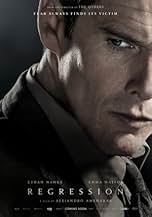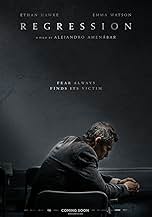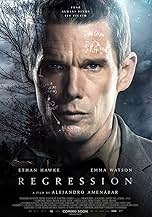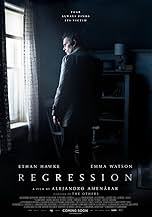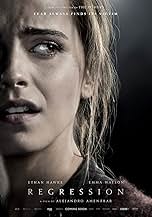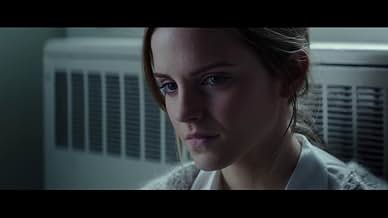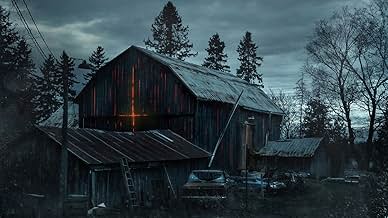Ein Detektiv und ein Psychoanalytiker decken Beweise für einen satanischen Kult auf, während sie die schreckliche Vergangenheit einer jungen Frau untersuchen.Ein Detektiv und ein Psychoanalytiker decken Beweise für einen satanischen Kult auf, während sie die schreckliche Vergangenheit einer jungen Frau untersuchen.Ein Detektiv und ein Psychoanalytiker decken Beweise für einen satanischen Kult auf, während sie die schreckliche Vergangenheit einer jungen Frau untersuchen.
- Auszeichnungen
- 1 Gewinn & 2 Nominierungen insgesamt
Empfohlene Bewertungen
If you can trust an actor to make a good horror, lately that one is Ethan Hawke. From Sinister, to The Purge, or Daybreakers, he knows how to pick them and make the most of them.
A lot more psychological than the rest, Regression has a beautiful story, with a great dark atmosphere, suspense, scares, all the ingredients to a good little horror. I was intrigued from start to end, waiting to see more, trying to wrap my brain around it, and expecting a finish that would make the most sense.
And boy I got it all! It really is a great production, an example of what a horror should look like, goes hand in hand with Deliver Us From Evil, both movies are smart and filled with tension.
Cheers!
A lot more psychological than the rest, Regression has a beautiful story, with a great dark atmosphere, suspense, scares, all the ingredients to a good little horror. I was intrigued from start to end, waiting to see more, trying to wrap my brain around it, and expecting a finish that would make the most sense.
And boy I got it all! It really is a great production, an example of what a horror should look like, goes hand in hand with Deliver Us From Evil, both movies are smart and filled with tension.
Cheers!
Best thing: As Ethan Hawke is imagining the "fornication" alleged to have taken place in a barn in the middle of a Satanic meeting, we see his visualisation of a naked couple making out materialise inside the car that is parked in there. The Satanic visions are often (intentionally) hilarious. In another film we might be expected to take those same sequences seriously, but anyone who knows the slightest thing about the Satanic Panic will understand why that is not the case here.
Worst thing: Sometimes imitates the cheesy supernatural BS movies a little too accurately. When a woman is terrified by a domestic cat, I couldn't help but remember the stupidity of similarly styled movies like "The Rite" with Anthony Hopkins or "White Noise" with Michael Keaton. Despite the inevitable reversal, Regression can often feel rather more sincere in its depiction of superstitious hogwash than is really appropriate.
Alejandro Amenabar is a director who seems to hold an obsession with unusual twists on the concept of the afterlife (Open Your Eyes, The Others) and the opposition of faith and reason (The Sea Inside, Agora). It's a little unfortunate that audiences mainly seem to be disappointed by this film when they discover that there WASN'T a massive baby-murdering conspiracy organised by hooded Satanists - as if that were a massive surprise! (For once, a film claiming to be based on real life actually tells the truth.)
The real mystery here is how anyone comes to believe in hooded Satanists if there, in fact, weren't any. It is the subtext that much of what we see in the film is the product of mass hysteria which really made the film interesting to me.
As for performances, Ethan Hawke and David Thewlis are both brilliant. I've actually heard some people claim that Emma Watson is the best thing about this film, but it seemed clear to me that her accent wasn't even as convincing as in other films where she's used an American accent before.
Perhaps a rather odd comparison I'd like to make is with "The Witch". You see, "The Witch" showed events as they were described by settlers. Similarly "Regression" shows events very much from the perspective of Ethan Hawke's detective character. What we see in the film is the hysteria of unfounded fears from an insider's perspective and that is something common to both films.
So what is this film's take on the satanic panic? Well the clue's in the title. The key to everyone believing the crazy statements devoid of evidence so completely is the supposedly "scientific" methods of 'hypnotic regression'. This crosses over with some Satan-centred rhetoric on television and at the local Church to produce an explosive combination. One criticism I've heard is that a lot of those coming forth with dodgy statements were much younger than Emma Watson's character and were fed their stories much more forcefully, but I think the filmmakers are keen to show this from the perspective of a well-meaning relateable police officer who is trying to do his job well. That would be a tough sell if he were shown badgering young children in the interview room.
While I greatly admired many aspects of Amenabar's previous film "Agora" I recognise that it has a number of failings. But Regression was a very interesting and compelling cinematic experience for me and I simply do not understand the hate.
Worst thing: Sometimes imitates the cheesy supernatural BS movies a little too accurately. When a woman is terrified by a domestic cat, I couldn't help but remember the stupidity of similarly styled movies like "The Rite" with Anthony Hopkins or "White Noise" with Michael Keaton. Despite the inevitable reversal, Regression can often feel rather more sincere in its depiction of superstitious hogwash than is really appropriate.
Alejandro Amenabar is a director who seems to hold an obsession with unusual twists on the concept of the afterlife (Open Your Eyes, The Others) and the opposition of faith and reason (The Sea Inside, Agora). It's a little unfortunate that audiences mainly seem to be disappointed by this film when they discover that there WASN'T a massive baby-murdering conspiracy organised by hooded Satanists - as if that were a massive surprise! (For once, a film claiming to be based on real life actually tells the truth.)
The real mystery here is how anyone comes to believe in hooded Satanists if there, in fact, weren't any. It is the subtext that much of what we see in the film is the product of mass hysteria which really made the film interesting to me.
As for performances, Ethan Hawke and David Thewlis are both brilliant. I've actually heard some people claim that Emma Watson is the best thing about this film, but it seemed clear to me that her accent wasn't even as convincing as in other films where she's used an American accent before.
Perhaps a rather odd comparison I'd like to make is with "The Witch". You see, "The Witch" showed events as they were described by settlers. Similarly "Regression" shows events very much from the perspective of Ethan Hawke's detective character. What we see in the film is the hysteria of unfounded fears from an insider's perspective and that is something common to both films.
So what is this film's take on the satanic panic? Well the clue's in the title. The key to everyone believing the crazy statements devoid of evidence so completely is the supposedly "scientific" methods of 'hypnotic regression'. This crosses over with some Satan-centred rhetoric on television and at the local Church to produce an explosive combination. One criticism I've heard is that a lot of those coming forth with dodgy statements were much younger than Emma Watson's character and were fed their stories much more forcefully, but I think the filmmakers are keen to show this from the perspective of a well-meaning relateable police officer who is trying to do his job well. That would be a tough sell if he were shown badgering young children in the interview room.
While I greatly admired many aspects of Amenabar's previous film "Agora" I recognise that it has a number of failings. But Regression was a very interesting and compelling cinematic experience for me and I simply do not understand the hate.
This film is not a conventional 7 - a score I would tend to give to a decent but not outstanding film. Regression was in some ways an 8, or dare I say it 9, but some of its flaws are just too bad g to ignore.
I will start by talking about its strong points. The story line and script were engaging, unpredictable and fresh. There were enough twists and turns to keep the viewer guessing, and without too much in fact happening, the film is disturbing and uncomfortable to watch. The twists as the film goes on are not outlandish - a careful viewer will be able to pick up on a number of subtle clues. The acting is good and the characters succeed of convincing us of their roles - mostly.
What then is wrong? First and foremost - whilst the female lead is a good actress, her American accent just isn't convincing enough for us to forget about Hermione. Secondly, whilst I am no expert of the American justice system, some of the practises and actions taken by the police seem questionable and unrealistic. The psychologist is cliché and annoying - going round insulting strangers for having religious beliefs. The ending is an anti climax once the big revelation has occurred, and it seems like the writers tried to re kindle the atmosphere, which doesn't happen. The ending is also a bit hard to square in your mind logically.
Therefore, whilst this film is a very enjoyable watch, its flaws deprive it of the 8+ score in my eyes.
I will start by talking about its strong points. The story line and script were engaging, unpredictable and fresh. There were enough twists and turns to keep the viewer guessing, and without too much in fact happening, the film is disturbing and uncomfortable to watch. The twists as the film goes on are not outlandish - a careful viewer will be able to pick up on a number of subtle clues. The acting is good and the characters succeed of convincing us of their roles - mostly.
What then is wrong? First and foremost - whilst the female lead is a good actress, her American accent just isn't convincing enough for us to forget about Hermione. Secondly, whilst I am no expert of the American justice system, some of the practises and actions taken by the police seem questionable and unrealistic. The psychologist is cliché and annoying - going round insulting strangers for having religious beliefs. The ending is an anti climax once the big revelation has occurred, and it seems like the writers tried to re kindle the atmosphere, which doesn't happen. The ending is also a bit hard to square in your mind logically.
Therefore, whilst this film is a very enjoyable watch, its flaws deprive it of the 8+ score in my eyes.
For a long time, Alejandro Amenabar has been one of my favorite writer- directors for the twisted suspense thrillers. He was quite prolific at the turn of the century -- "Thesis" (1996), "Open Your Eyes" (1997) and his English-language debut "The Others" (2001). His biographical drama "The Sea Inside" won an Oscar for Best Foreign Language Film in 2004.
Since then though, his output had been sparse. That was why when I heard that he will be releasing a new film this year entitled "Regression," I made sure I went to watch it.
Seventeen-year old Angela Gray accuses her father of sexually abusing her. Detective Bruce Kenner is assigned to her case. The father meekly admits to the crime, but does not actually recall doing it. Kenner seeks the help of Psychology professor Kenneth Raines to elicit his repressed memories, as well as those of the other members of the Gray family, via hypnotic regression. What is revealed from these sessions are diabolical confessions of such disturbing nature that Kenner himself could not get them out of his own mind.
Ethan Hawke is such a good actor, really. From his feature debut in "Dead Poet's Society," then "Before Sunrise" (and its series), "Gattaca," "Sinister" to his Oscar-nominated performances in "Training Day" and "Boyhood," this guy can really portray the most ordinary characters and wind up making them very memorable. His intense take of the obsessed Bruce Kenner was riveting and infectious. His visions become our visions, his beliefs our beliefs. He had a flawless interactive rapport with Amenabar's camera, registering and conveying the anger, paranoia, confusion, and fear of his character so well on screen.
Emma Watson returns on her trajectory to becoming a serious movie actress after being sidelined by unfortunate roles in "This is the End" and "Noah." The talent and the promise are there, but the connection with her role as the troubled Angela was not as convincing as that of Hawke's. Her best performances were still those for Hermione Granger. Her young adult performances in films like "Perks of Being a Wallflower" and "The Bling Ring" had a certain unnatural stiffness in them, as it was again here as well.
Credible supporting performances were given by David Thewlis as the authoritative Prof. Raines and David Dencik as Angela's repentant father John. Going a bit over the top was Dale Dickey and her exaggeratedly demented performance as Angela's grandmother Rose. The strangest casting decision was that of Lothaire Bluteau as the priest Reverend Murray. He exuded such a creepy vibe, which of course may be the director's intention.
While "Regression" was still not on the same level of excellence as "Open Your Eyes" or "The Others," Alejandro Amenabar returned to form with this comeback project of sorts. The script, though weak and flawed in certain aspects (like motive, for one important example), was still logical and grounded despite dealing with controversial religious and psychological matters. The storytelling engages you despite the dark unpleasant topics and relentlessly morbid atmosphere. I am looking forward to the next Amenabar opus. I hope it does not take so many years anymore. 7/10
Since then though, his output had been sparse. That was why when I heard that he will be releasing a new film this year entitled "Regression," I made sure I went to watch it.
Seventeen-year old Angela Gray accuses her father of sexually abusing her. Detective Bruce Kenner is assigned to her case. The father meekly admits to the crime, but does not actually recall doing it. Kenner seeks the help of Psychology professor Kenneth Raines to elicit his repressed memories, as well as those of the other members of the Gray family, via hypnotic regression. What is revealed from these sessions are diabolical confessions of such disturbing nature that Kenner himself could not get them out of his own mind.
Ethan Hawke is such a good actor, really. From his feature debut in "Dead Poet's Society," then "Before Sunrise" (and its series), "Gattaca," "Sinister" to his Oscar-nominated performances in "Training Day" and "Boyhood," this guy can really portray the most ordinary characters and wind up making them very memorable. His intense take of the obsessed Bruce Kenner was riveting and infectious. His visions become our visions, his beliefs our beliefs. He had a flawless interactive rapport with Amenabar's camera, registering and conveying the anger, paranoia, confusion, and fear of his character so well on screen.
Emma Watson returns on her trajectory to becoming a serious movie actress after being sidelined by unfortunate roles in "This is the End" and "Noah." The talent and the promise are there, but the connection with her role as the troubled Angela was not as convincing as that of Hawke's. Her best performances were still those for Hermione Granger. Her young adult performances in films like "Perks of Being a Wallflower" and "The Bling Ring" had a certain unnatural stiffness in them, as it was again here as well.
Credible supporting performances were given by David Thewlis as the authoritative Prof. Raines and David Dencik as Angela's repentant father John. Going a bit over the top was Dale Dickey and her exaggeratedly demented performance as Angela's grandmother Rose. The strangest casting decision was that of Lothaire Bluteau as the priest Reverend Murray. He exuded such a creepy vibe, which of course may be the director's intention.
While "Regression" was still not on the same level of excellence as "Open Your Eyes" or "The Others," Alejandro Amenabar returned to form with this comeback project of sorts. The script, though weak and flawed in certain aspects (like motive, for one important example), was still logical and grounded despite dealing with controversial religious and psychological matters. The storytelling engages you despite the dark unpleasant topics and relentlessly morbid atmosphere. I am looking forward to the next Amenabar opus. I hope it does not take so many years anymore. 7/10
I knew nothing about the film before I watched it, nor about the events on which it is based. Perhaps because of this I became very confused about the film's point of view.
At base, this film asks the viewer to try to distinguish reality from fantasy during a police inquiry into accusations of satanic abuse. The problem with the fim-maker's style, for me, was that all the resources of cinema were used to illustrate not only the satanic abuse reported by witnesses but also other scenarios that had not been reported, so we saw constant scenes of abusers with spookily made-up faces and monks' cowls, and various horrific depictions of satanic abuse. Because cinema is a naturalistic medium, it was difficult to know what was fantasy and what was reality.
The film in some ways had a classic detective-story structure, with Ethan Hawke as the determined investigator. But it became clear that he was an unreliable first-person character after he began behaving irrationally, and that left me, as a viewer, with nothing to cling to as a source of viewpoint in the film. When it came to scenes in which the detective was absent, it was even more difficult to distinguish what the film-maker was depicting as real and what as fantasy. For example, when the victim's grandmother went out to her shed, she saw a normal cat, which turned into a devil cat. This had nothing to do with the investigation, yet its satanic imagery was of the same type as that provoked by the regression-therapy sessions. Perhaps some point was being made about the phenomenon of group hallucination or delusion, but the film repeatedly neglected its responsibility to give us a touchstone by which we could judge the accuracy of what we were seeing.
I think the film could have addressed the topic better with the excellent actors at its disposal by NOT depicting any of the satanic events. It would have been all the more chilling for that, adding to the tension of the inquiry. The most famous dramatisation of this sort of subject matter was Arthur Miller's "The Crucible". Miller creates nightmarish scenes of communal paranoia but without illustrating any of the events described by the witnesses. And this does not hinder the story's potency. (What could be more horrific than to see Miller's village girls in full accusatory mode, triggering the arrest of various pillars of the community on charges of devil worship?) "Regression", however, lacks the necessary moral distance from the events it depicts. Only in the last minute or two is sanity restored. I left the cinema feeling as if I had been cruelly led about by the nose to no satisfactory purpose.
At base, this film asks the viewer to try to distinguish reality from fantasy during a police inquiry into accusations of satanic abuse. The problem with the fim-maker's style, for me, was that all the resources of cinema were used to illustrate not only the satanic abuse reported by witnesses but also other scenarios that had not been reported, so we saw constant scenes of abusers with spookily made-up faces and monks' cowls, and various horrific depictions of satanic abuse. Because cinema is a naturalistic medium, it was difficult to know what was fantasy and what was reality.
The film in some ways had a classic detective-story structure, with Ethan Hawke as the determined investigator. But it became clear that he was an unreliable first-person character after he began behaving irrationally, and that left me, as a viewer, with nothing to cling to as a source of viewpoint in the film. When it came to scenes in which the detective was absent, it was even more difficult to distinguish what the film-maker was depicting as real and what as fantasy. For example, when the victim's grandmother went out to her shed, she saw a normal cat, which turned into a devil cat. This had nothing to do with the investigation, yet its satanic imagery was of the same type as that provoked by the regression-therapy sessions. Perhaps some point was being made about the phenomenon of group hallucination or delusion, but the film repeatedly neglected its responsibility to give us a touchstone by which we could judge the accuracy of what we were seeing.
I think the film could have addressed the topic better with the excellent actors at its disposal by NOT depicting any of the satanic events. It would have been all the more chilling for that, adding to the tension of the inquiry. The most famous dramatisation of this sort of subject matter was Arthur Miller's "The Crucible". Miller creates nightmarish scenes of communal paranoia but without illustrating any of the events described by the witnesses. And this does not hinder the story's potency. (What could be more horrific than to see Miller's village girls in full accusatory mode, triggering the arrest of various pillars of the community on charges of devil worship?) "Regression", however, lacks the necessary moral distance from the events it depicts. Only in the last minute or two is sanity restored. I left the cinema feeling as if I had been cruelly led about by the nose to no satisfactory purpose.
Wusstest du schon
- Wissenswertes"Satanic Panic" is the name of the cultural obsession with "Satanic Ritual Abuse" which originated in the United States in the 1980s with the now-discredited memoir-style book "Michelle Remembers," written by Canadians Michelle Smith and her husband, psychiatrist Lawrence Pazder. The authors made waves during the 80's by traveling the talk-show circuit and testifying as expert witnesses in criminal trials alleging Satanic abuse. The book and Smith are represented in the film as "In Satan's Name" by S. Cooper, who is shown as a TV interview subject whose face is obscured in shadow to hide her identity.
- PatzerThe poster of Polish Death/Black Metal Band Behemoth is from 2014 whereas the film is set in 1990.
- Zitate
Bruce Kenner: I am starting to use my head again.
- VerbindungenFeatured in Projector: Macbeth/Regression (2015)
- SoundtracksThat's Where the Blues Begin
Written by Thomm Jutz and Peter Cronin
Music Library & SFX SL / Audio Network Ltd
Top-Auswahl
Melde dich zum Bewerten an und greife auf die Watchlist für personalisierte Empfehlungen zu.
- How long is Regression?Powered by Alexa
Details
- Erscheinungsdatum
- Herkunftsländer
- Offizieller Standort
- Sprache
- Auch bekannt als
- Truy Hồi Ký Ức
- Drehorte
- RC Harris Water Treatment Plant, Toronto, Ontario, Kanada(prison exteriors)
- Produktionsfirmen
- Weitere beteiligte Unternehmen bei IMDbPro anzeigen
Box Office
- Budget
- 20.000.000 $ (geschätzt)
- Bruttoertrag in den USA und Kanada
- 55.039 $
- Eröffnungswochenende in den USA und in Kanada
- 33.915 $
- 7. Feb. 2016
- Weltweiter Bruttoertrag
- 17.671.101 $
- Laufzeit1 Stunde 46 Minuten
- Farbe
- Sound-Mix
- Seitenverhältnis
- 2.35 : 1
Zu dieser Seite beitragen
Bearbeitung vorschlagen oder fehlenden Inhalt hinzufügen





